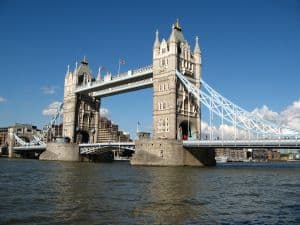In English, most of the time, we write with lower case letters:
List of small letters / lower case letters:
a b c d e f g h i j k l m n o p q r s t u v w x y z
We use capital letters for specific situations.
List of capital letters / upper case letters:
A B C D E F G H I J K L M N O P Q R S T U V W X Y Z
In this lesson, you will learn the main rules for when to use capital letters.
The first letter of a sentence or speech
The fist letter of the first word of a sentence or speech is always a capital letter.
Examples:
The man was hungry. He said “Do you have any sandwiches?”
The personal subject pronoun “I” (first person singular) is always a capital letter.
Examples:
Jane thinks that I drink too much coffee. ![]()
Jane thinks that i drink too much coffee. ![]()
She also thinks that I’m a good teacher. ![]()
She also thinks that i’m a good teacher. ![]()
Days of the week
The first letter of the days of the week is always a capital letter.
The days of the week in English:
Monday, Tuesday, Wednesday, Thursday, Friday, Saturday and Sunday
Example:
They watched a football match last Saturday.
Months of the year
The first letter of the months of the year is also a capital letter.
The 12 months of the year in English:
January, February, March, April, May, June, July, August, September, October, November and December
Example:
London is very cold in December.
Countries, nationalities and languages
The first letter of all countries, nationalities and languages is a capital letter.
Examples:
David is going to Brazil to learn Portuguese.
David likes Brazilian food.
Towns, states, continents and other geographical divisions
Examples:
Here is London.
One of the biggest states in America is Texas.
The names of the continents are:
Africa, Europe, Asia, North America, South America and Australia.
Names of rivers, lakes, canals, mountains
Names of rivers, lakes, canals, mountains always start with a capital letter.
Examples:
This river is called the River Thames
This lake is called Lake Michigan
This mountain is called Mount Fuji
Names of streets, buildings, monuments and parks

The name of this bridge is Tower Bridge.
This park is called Central Park.
There are lots of shops on Oxford Street in London.
People’s names and titles
Examples:
My doctor is called Doctor Jones.

This is Sergeant Smith.
We often write people’s titles as an abbreviation.
Mrs = married woman
Miss = single woman
Mr = man
The first letter of the abbreviation starts with a capital letter.
Example:
My teacher is called Mr Gibson.
Holidays / festivals
We write the names of holidays and festivals with the first letter as a capital letter.
Some common holidays and festivals are:
Christmas, Easter, Thanksgiving, New Year, Ramadan, Yom Kippur.
Example:
They are very excited about Christmas.
Names of religions
We write the names of religions with a capital letter as the first letter of the word.
Some common religions are:
Buddhism, Christianity, Hinduism, Islam, Judaism
Example:
One of the main religions in England is Christianity.
Names of companies, organisations and trademarks
Examples:
Ford, Microsoft, Coca Cola, British Airways and many others.
This car was made by Volkswagen.
Abbreviations and acronyms
Examples:
This is the flag of the USA.
USA = United States of America
The UN headquarters is in New York.
UN = United Nations
Titles of articles, books, films, poems, songs and plays
There are no real grammar rules for the capitalisation of titles. We use style guides. For example, journalists who write articles for the BBC website follow a style guide given to them by the BBC. It is important to be consistent.
Here is a style guide used by many English-speaking journalists for writing titles:
Use capitals for the first letter of:
– the first word
– nouns, pronouns, adjectives, verbs, adverbs
Use lower case for the first letter of the following words:
a, and, at, for, from, in, of, on, the, to (except if it is the first word of the title)
Example title following the above style guide:
“Harry Potter and the Order of the Phoenix”
Other lessons
How to use DO and MAKE in English
Prepositions of place IN, ON and AT
Types of English abbreviations
IELTS tips from Carol
Video lesson
Here is the lesson on the Crown Academy of English Youtube channel. Don’t forget to subscribe!


atle.refoxs.nl says
Hi to every single one, it’s genuinely a good for me to visit this website,
it contains helpful Information.
sarah says
very well content.
Muazu says
Very good
Jennifer Baird says
Am I mistaken in thinking old English used capital letters at the beginning of a word as partial emphasis – as in, some may use capitals to emphasize a full word, as in the case of someone yelling. But in general discourse it might or could be used to put some emphasis on a certain word, to Capitalize the first letter?